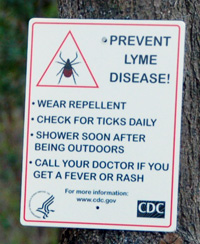Most residents in Delaware are not worried about Lyme disease

Delaware is one of the top 10 states in the country with the highest incidence of Lyme disease. Yet, a newly published survey, which examines the effectiveness of state awareness campaigns and educational programs, found that Delaware residents have a limited understanding of tick-borne diseases and the potential risks ticks may present. Children were found to be at particular risk with a low number of families practicing tick bite prevention behaviors.
The study, led by Gupta from the Department of Public and Allied Health Sciences at Delaware State University, found that “participants’ knowledge of tick-borne diseases was poor,” with less than half (38.4%) believing ticks were problematic in Delaware. In fact, while more than half of the study’s respondents indicated having seen such prevention campaigns, only 13% “strongly agreed” that Lyme disease is a problem in Delaware. [1]
Study goal: “The purpose of this study was to investigate knowledge about TBDs as well as beliefs and practices related to a variety of personal prevention methods among individuals in Delaware and report on the outreach/impact of [Delaware Division of Public Health] DPH’s prevention campaign,” Gupta explains.
The Delaware Division of Public Health (DPH) has recommended a number of prevention practices to reduce the probability of getting tick bites and the risk of acquiring tick-borne diseases (TBDs). These recommendations 
- Bath or shower, as soon as possible, after coming indoors (preferably within 2 hours)
- Perform frequent tick checks
- Apply tick repellents to skin or clothing
- Examine pets for the presence of ticks
- Tuck pants into socks
- Wear long sleeves
The DPH widely distributed their prevention recommendations using billboards, brochures (displayed in doctors’ offices, state parks, movie theaters), newspaper advertisements, the DPH website and social media.
Gupta found that “a little over half of the respondents (51.6%) indicated having seen advertisements/infomercials/flyers for protection from ticks or the disease agents spread by ticks.” However, only 13% of the people said they changed their behaviors to protect themselves from ticks after reading the information.
“It appears although a majority of the study participants had heard of [Lyme disease], risk perception regarding [Lyme disease] was low,” Gupta states.
Delaware residents do not put a high priority on practicing tick bite prevention behaviors. The study found only 22.2% perform regular tick checks, 22.4% regularly use insect repellents and 16.6% wear light-colored clothing on a regular basis.
Most alarming, however, may be the study’s findings on prevention behaviors among children. Parent responses indicated:
- 45.6% – their child takes a shower within 2 hours after returning indoors
- 33.7% – parents apply insect repellents on their child when outdoors during the summer months
- 31.5% – parents perform tick checks on their child when returning from outdoors
- 26.9% – their child wears light-colored clothing to facilitate easy identification and removal of ticks
- 19.1% – parents treat their child’s outdoor clothing with insect repellents made for clothing (such as Permethrin)
- 11.7% – parents tuck their child’s pants into socks when outdoors
“Existing public health communication efforts on tick-borne diseases in Delaware do not appear to be having the desired effect,” says Gupta. But Delaware is not alone. “In the New England and Mid-Atlantic regions, 13.9% and 20.8% of respondents, respectively, reported either that no [tick-borne diseases] TBDs occur in their area or that they had not heard of any of these diseases,” writes Gupta.
The authors’ hope the results of this study will help in developing more effective public awareness campaigns throughout the state.
References:
- Gupta S, Eggers P, Arana A, et al. Knowledge and preventive behaviors towards tick-borne diseases in Delaware. Ticks Tick Borne Dis. 2018.




Julie Harlow
03/26/2018 (1:31 pm)
As a life long Delaware resident, this is a prime example to why I had no idea I had Lyme disease. Suffering for years with different symptoms, periods of sickness & remission while the Lyme & co infections hid & reappeared in my body, I have seen my general practioner, specialists, and even seen by an infectious disease doctor, all of whom didn’t even test me or speak of it. I was told my symptoms were in my head and then finally that I had Fibromyalgia, but no one could tell me how I got it??
People need to know about Lyme, and everything that comes with it. It’s an awful experience that when you finally do talk a doc into testing, the western blot fails to properly diagnose half the time! And most docs have no idea! Would you be satisfied with a faulty AIDS test? Many superb physicians here know nothing of how Lyme is an immunosuppressive illness, therefore your body fails to make antibodies that would show on the western blot. Not only that but it only tests for one strand! Just one! There are hundreds. I am still in the midst of trying to financially afford proper testing through DNA Connextions for myself and my family. This entire process has been alienating to say the least, all due to a serious lack of knowledge and proper testing as well as insurance coverage. It’s heartbreaking to know that you are ill and have everyone tell you that it’s in your head or chronic Lyme doesn’t exist. What time are we living in where you have to fight to prove you are sick, and patients know more than their physicians? I literally have paperwork where my son had a tick lodged behind his ear, he got a high fever directly after, but since there was no bull eye rash, they said it wasn’t Lyme and sent us home. I kick myself for accepting that answer but I didn’t know any better. There are so many awful misconceptions & lack of awareness that must change. This isn’t just the common people who lack education and knowledge, it’s the medical community as well. Being one of the most heavily tick populated areas there are no LLMD’s (Lyme literate medical doctor) to see children, and only one doctor who is Lyme literate for adults. I have had to advocate and fight to get proper care. It’s more than alarming to me that the general population here thinks Lyme is no big deal and testing is just as simple as stopping by Labcorp and boom you don’t have Lyme. The entire illness is dismissed and deeply underestimated. Here in Delaware, It’s commonly referred to as a minor cold that can be cleared up with a script of antibiotics for a few weeks or simply used in the past tense as “I had Lyme once”. It is so saddening because I know there must be hundreds to possibly thousands of people and children whom are improperly diagnosed with Fibromyalgia, IBS, CFS, Lupus, PTSD, MS, ADD, Anxiety, Depression and other illnesses that Lyme likes to imitate. I have had to live with so much pain, as well as watch my children suffer and it could of been lessened or avoided if more of our people were aware. Delawareans! Listen to me, watch “UNDER OUR SKIN” the documentary. It’s availabe online and it will change your life. If you suffer from fatigue, muscle pain, GI problems, cognitive issues, memory issues, anxiety, air hunger, no energy, muscle weakness, atrophy, headaches, joint pain, stiffness, heart palpitation, light sensitivity, tingling, numbness, depression, sound sensitivity,
difficult thinking, light headedness, vertigo, stomach aches…any or all…some or many….PLEASE DO YOURSELF A FAVOR. Don’t rule out Lyme. It can affect people physically and sometimes only mentally, Listen to your body, and remember, not all doctors know everything. Be your own advocate. Research. There’s plenty of real medical research. There’s plenty of real people. Young people, go hashtag #Lyme or #Lymeawareness on Insta and you’ll find thousands of people. Trust us Lymies, This Illness is widely undiagnosed, misdiagnosed and plain old ignored. If you live here, you know ticks are everywhere! Myself, husband and my children have had ticks every year! Walking through Cape Henlopen State Park is a hot bed, 4 years ago my daughter stepped into what must of been a nest, and had over 25 ticks on her ankles after walking on the trail. I found this post looking for Lyme Education for children in Delaware & there seemed to be very little advocacy. I think it’s time people start learning about Lyme. I will continue to spread awareness, as this has changed my family forever. Thank you for the research.
Doris Gross
08/24/2018 (1:32 am)
I live in Milford, DE and suspect that I need the appropriate treatment for Lyme Disease and possibly other tick borne diseases. Can you tell me who the Lyme literate doctor is who treats adults. Thanks so much.
Geri Smith
04/11/2019 (1:27 pm)
Hi Doris, Do you think you were exposed in Milford? We are getting ready to move there. I live in Unionville PA and have had Lyme more than once. There is a pretty good network of support here because so many of us are outdoorsy types or horse people, and have had it. I have been bitten after walking in tall grass and working around my house clearing brush. One of my friends travelled to Pocomoke MD for treatment. That isn’t terribly far from Milford – maybe an hour south.
Lauren
09/17/2021 (9:27 am)
Hi Julie, I’d be curious to know who your lyme literate doc in DE is.
Vicky
03/31/2023 (7:34 pm)
Well said!! Hope you are still at it. It was my journey too. Horrible and I’m still fighting it